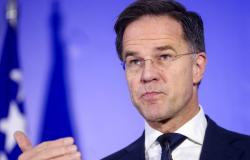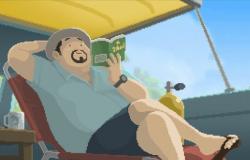Today and tomorrow we vote, you know, and as often happens, Il Foglio offers its readers two keys to approaching the polls. The first key to understanding is: how do the leaflets vote? Here you will read a report. The second key to understanding is: who to vote for in the elections? Our modest vote indication today does not concern a single party but concerns an idea, a concept, perhaps even an ideal, which ultimately is the true common thread not of the electoral campaign which is magnificently about to end but of the Europe which it is finally about to be built. The ideal coincides with a concept splendidly framed two days ago in France, by the world’s greats, during the celebrations for the eightieth anniversary of the Normandy landings. Eighty years ago, the Allies did everything necessary to defend the freedom of Europe. Eighty years later, Europe’s defense is measured against Ukraine. Everything that Europe defends today, when it comes to democracy, freedom, regimes, battles against new fascisms, is defended by Ukraine. Donald Tusk, Polish Prime Minister, urged his country’s voters to go and vote on Saturday and Sunday, guided by one principle: making the right choice to have a Europe capable of protecting itself and avoiding a war that could be larger than what we have seen in recent years.
Today and tomorrow we vote, you know, and as often happens, Il Foglio offers its readers two keys to approaching the polls. The first key to understanding is: how do the leaflets vote? Here you will read a report. The second key to understanding is: who to vote for in the elections? Our modest vote indication today does not concern a single party but concerns an idea, a concept, perhaps even an ideal, which ultimately is the true common thread not of the electoral campaign which is magnificently about to end but of the Europe which it is finally about to be built. The ideal coincides with a concept splendidly framed two days ago in France, by the world’s greats, during the celebrations for the eightieth anniversary of the Normandy landings. Eighty years ago, the Allies did everything necessary to defend the freedom of Europe. Eighty years later, Europe’s defense is measured against Ukraine. Everything that Europe defends today, when it comes to democracy, freedom, regimes, battles against new fascisms, is defended by Ukraine. Donald Tusk, Polish Prime Minister, urged his country’s voters to go and vote on Saturday and Sunday, guided by one principle: making the right choice to have a Europe capable of protecting itself and avoiding a war that could be larger than what we have seen in recent years.
Poland, like the Baltic countries, like Finland, like Estonia, like Lithuania, like Latvia, knows what it means to live with Russia breathing down your neck. But the message that the Polish prime minister is sending to his voters is the same that should be sent to Italian voters: vote for the parties that can allow Europe to protect itself better, vote for the parties that can help Ukraine to protect itself better, vote for all those who can help politically punish all those who dream of shifting the center of gravity of Europe towards the policy of disengagement, towards the strategy of surrender, towards the idea that the only possible peace is to disarm the West in order to wave finally the white flag. The solidity of the Europe of the future will depend on many factors, naturally, it will depend on the ideas that the political forces that will guide the community institutions will put into play on the single market, on competitiveness, on energy, on the ecological transition, on agriculture, on immigration and European debt. But what will count, before anything else, will be the ability that the Europe of the future will have to do everything necessary, whatever it takes, to protect its citizens from those who have chosen to question the non-negotiable values of societies open. Voting well in the European elections means voting for parties capable of defending their countries from Putin’s threats and voting well in the European elections means understanding that those who want to weaken Europe are pursuing the same objective that the enemies of the open society dream of: making people count on democracies less, make democracies count more, offer a competitive advantage to bloodthirsty regimes and weaken our ability to defend ourselves. Voting against Putin at the polls means voting for the less timid parties when it comes to Ukraine. But it can also mean voting, within the lists, for all those who can help prevent the line of one’s favorite party from being dictated and conditioned by those who consider Ukraine an unbearable burden, by those who consider Putin only a statesman who is wrong, from those who consider pacifism only a substitute for hatred against the West. The last two years in Europe have shown that defending an attacked democracy has a cost, of course, but they have also shown that Europe, when faced with those who threaten our freedom, knows all things considered how to unite, knows all things considered how to react, knows all in all how to flex its muscles, it knows all in all how to sanction rogue states while avoiding placing the burden of defense of an attacked country on its citizens.
Two years ago, when Putin decided to invade Ukraine, the useful idiots of Putinism, who deserve to be punished in these elections, said that Europe would not make it, that defending Ukraine was a waste of time, that Russia would sooner or later achieve its goals, that sanctions would do more harm to Europe than to Putin, that inflation would go crazy, that the economy would collapse and that employment would suffer a lethal blow from commitment that Europe has dedicated to Ukraine.
Fortunately, it didn’t go that way, and the fact that Ukraine was not at the center of the electoral campaign of the leaders of the main Italian parties can be considered a depressing element for those who think it is necessary to defend the non-negotiable values of a society every day. open but can also be considered an encouraging element if you think about how few arguments the useful idiots of Putinism have today to demonstrate that defending an attacked democracy is not a good and right thing. “I belong – said the French Prime Minister Gabriel Attal, 35, two days ago – to a generation that has never known war. A generation whose parents did not experience war. A generation that grew up under the signs of freedom and independence. History is a lesson for the future and today, more than ever, we need to feel and listen and understand those lessons of the past as war knocks on Europe’s door once again.” Voting well today means voting against all those who, on the right and left, use the word “peace” to try to force Ukraine to surrender, it means voting against all those who dream of disarming a people who are defending Europe from the threats of totalitarian regimes, means voting against all those who, when they think of the Europe of the future, think of the same Europe that Putin dreams of: weaker, less integrated, more disunited, more disarmed, further away from Ukraine. Good rating everyone.





